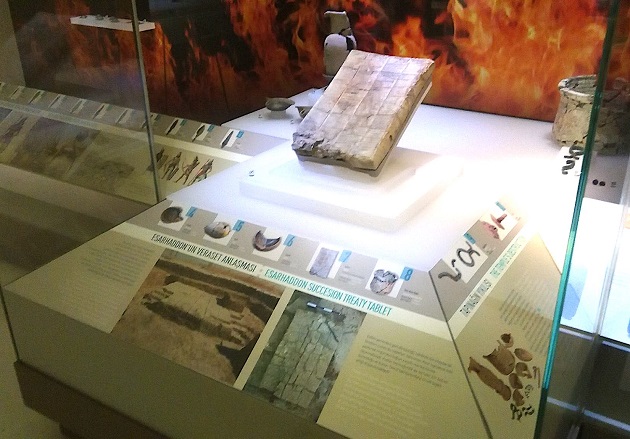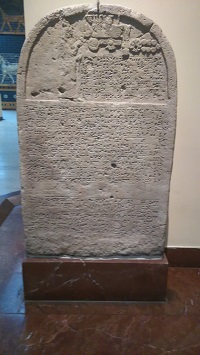A relief in the Istanbul Archaeology Museum captures Sennacherib’s pride and character.
 Succession Treaty of Esarhaddon. Antioch Archaeology Museum. / Marc Madrigal
Succession Treaty of Esarhaddon. Antioch Archaeology Museum. / Marc Madrigal
Around the 8th century BCE, Sennacherib was the king of Assyria, the most powerful nation in the world. He had power, money, and a very large technologically advanced army. He crushed his opponents, obliterated the northern kingdom of Israel, and raided the southern kingdom of Judah.
After completely destroying the city of Lachish, he turned his sights to Jerusalem. We read both in the book of Kings and the book of Chronicles that he sieged the city of Jerusalem and threatened king Hezekiah with his messengers:
“Behold, you have heard what the kings of Assyria have done to all lands, devoting them to destruction. And shall you be delivered? Have the gods of the nations delivered them, the nations that my fathers destroyed, Gozan, Haran, Rezeph, and the people of Eden who were in Telassar? Where is the king of Hamath, the king of Arpad, the king of the city of Sepharvaim, the king of Hena, or the king of Ivvah?’” (2. Kings 19:11-13, ESV)
Sennacherib thought he was the king of the world, that everyone owed him something. He was so arrogant, he even believed that he could trap and deceive Yahweh. A relief in the Istanbul Archaeology Museum actually captures Sennacherib’s pride and character to perfection. A stele dated 705 BCE–681 BCE discovered in Nineveh, which introduces a city ordinance dealing with the construction of a new royal road, begins with the following introduction:
“Sennacherib, the great king, mighty king, king of the universe, king of Assyria, king of the four regions of the world, favorite of the great gods. Aššur and Ištar have given me an invincible weapon and have opened my hand for the destruction of the enemies of Assyria. Trusting in their great might, I led my armies from one end of the earth to the other and brought in submission at my feet all princes, dwelling in palaces, of the four quarters of the world, and they assumed my yoke.”
This is the prideful Sennacherib that decided to challenge Yahweh. Unfortunately for him, this was also his undoing. After king Hezekiah and the prophet Isaiah spent the night praying and fasting, “the Lord sent an angel who cut down every mighty man of valor, leader, and captain in the camp of the king of Assyria. So he returned shamefaced to his own land. And when he had gone into the temple of his god, some of his own offspring struck him down with the sword there.” (2. Chronicles 32:21, ESV)
Sennacherib's arrogance was his downfall. A valuable lesson all leaders should keep in mind. However, it would be wrong to think Sennacherib’s sin only affected him. Actually, his actions also paved the way for the demise of the Assyrian Empire.
 Sennacherib Stele. Istanbul Archaeology Museum. / Marc Madrigal
Sennacherib Stele. Istanbul Archaeology Museum. / Marc MadrigalFollowing the death of Sennacherib, a civil war ensued in Assyria amongst his sons. Esarhaddon was the eventual winner. To prevent a similar event from occurring again, Esarhaddon created a succession treaty. This treaty is currently displayed in the Archaeological Museum in Antioch, Turkey. According to the treaty, Esarhaddon’s youngest son Ashurbanipal was chosen as the heir of the Assyrian throne, while his older son, Shamash-shum-ukin was made heir to the city-state of Babylon- An Assyrian possession at the time. Eventually, in 652 BCE, Shamash-shum-ukin rebelled. His rebellion was a failure but it set the stage for the Babylonian challenge to the Assyrian throne. In 627 BCE when Asshurbanipal died, Nabopolassar who had become king in Babylon, presented another challenge to the throne of Assyria, and this time Nineveh did fall in 612 BCE.
The Assyrian empire was destroyed never to be established again. Such is the end of all earthly kings and kingdoms who think their arrogant actions have no consequences. Many of the minor prophets captured this image, especially Nahum. For Nahum (whose name means “Comfort”), Nineveh is a “bloody city”; A “prostitute, [of] graceful and deadly charms, who betrays nations with her whorings, and peoples with her charms.” (Nahum 3:1,4, ESV)
The fall of Assyria is a reminder that God does not forget, that he always holds nations accountable for their prideful leaders and prideful actions. Our comfort is that in the Day of the Lord, all accounts will be settled, God’s kingdom will come on Earth, and all earthly kingdoms shall perish!
Marc Madrigal is a Board member in the Istanbul Protestant Church Foundation in Turkey.

Las opiniones vertidas por nuestros colaboradores se realizan a nivel personal, pudiendo coincidir o no con la postura de la dirección de Protestante Digital.
Si quieres comentar o